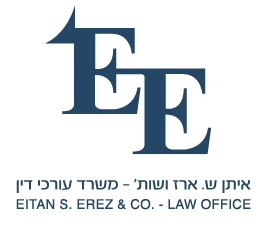היסטוריה
PRECEDENTS
Our firm has been responsible for numerous Supreme and District Court precedents in various litigation cases, especially in the fields of company restoration, liquidation, bankruptcy and defamation. Examples of these include, amongst many others, the right of a professional soccer player to sue his former club for severance pay (Eyal Beglaubter v. Maccabi Petah-Tikva) and the right of a hetrosexual not to be called a "homosexual" and to receive defamation damages for being referred to as such (Shimon Amsalem v. Ha'ir newspaper).
Payment of attorney's fees out of receivership funds
Decision of the Supreme Court, the honorable Justice Y. Amit, of January 3, 2016, in LCA 6764/15.
This was an appeal against a decision of the Jerusalem District Court (the honorable Justice Irit Cohen) in case no. 930-03-14 (motion no. 41 in case no., 30825-02-14) in which the debtors requested that the honorable court should approve retroactive and future payments to their attorney, starting from the date on which the receivership order was given in August 2014, which would be paid out of the receivership funds and at the creditors’ expense.
The Supreme Court allowed the appeal and held that the payment of a debtor’s fees to his attorney in good faith pursuant to the provisions of the Bankruptcy Ordinance applies only to his opposition to the bankruptcy proceeding, but after the grant of the receivership order there is no basis for the bankruptcy funds to continue to finance the fees of the debtor’s attorney, which circumvents the creditor priority rules, and this will only be permitted in exceptional cases.
Remuneration of an office holder
Bankruptcy Case 3000/08 Eli Reifman (in bankruptcy)
decision of the Tel-Aviv District Court, the honorable Justice E. Orenstin of February 9, 2014, in motion no. 162.
This was a motion that was filed by the trustee that he would be entitled to an amount of 8% of any sum that would actually be collected in the case, which was not pursuant to the Companies (Rules Regarding the Appointment of Receivers and Trustees and their Remuneration) Regulations, 5745-1985. The District Court approved the motion and determined that in the special circumstances of the case, it would be best if the remuneration for carrying out the special operations of the trustee was determined in advance. The court mentioned the fact that a decisive majority of the creditors agreed to the trustee’s request.
Rescinding a judgement who approved a compromise
a decision of the Tel-Aviv District Court (the honorable Justice Haim Tobi) of September 20, 2012, in motion no. 9.
In the circumstances of the case, several contracting companies filed with the Tel-Aviv District Court a claim for enforcement of an agreement with the owners of the apartments in the building. In addition, the companies filed a motion for interlocutory relief that would prohibit the residents from making or performing a transaction with regard to the land with any party other than themselves.
During an initial hearing that took place in the case, the court exerted all of its weight in order to induce the parties to make a procedural agreement according to which no hearing would take place on the interlocutory relief and that the main case would be determined without bringing evidence, and all of the evidence was brought before the court within the framework of the interlocutory motions, including in the action, would serve as a basis for deciding the case.
Several days later, one of the parties changed his mind and filed a motion to cancel the procedural arrangement.
Imprisonment of a bankrupt individual in proceedings pursuant to the Contempt of Court Ordinance
Bankruptcy File 3000/08 Eli Reifman (in bankruptcy)
this case involved contempt of court proceedings that were filed against the bankrupt, Eli Reifman, after the latter said that he had shares in the Emblaze company but did not transfer them to the trustee. In a series of decisions that were given by the District and Supreme Courts, the debtor was imprisoned for a cumulative period of approximately 90 days. In one of the decisions that were given by the Supreme Court [the decision of the honorable Justice Melzer of September 21, 2009 –- CrimA 7174/09] it was held that if a person is sentenced to imprisonment pursuant to section 6 of the Contempt of Court Ordinance, his case and the justification for his continued imprisonment should be examined at most once every six months (see section 6(4) of the Contempt of Court Ordinance). Imprisonment pursuant to section 6(1) of the Contempt of Court Ordinance is intended to ensure compliance with a judicial order, and naturally, as long as the order is not complied with, there is a justification in principle for continuing the imprisonment of the person in contempt. The applicant is able to comply with the judicial order and not to be imprisoned for even one day, since ‘he holds the keys of the jail.’ Subsequently, the Supreme Court ruled that when dealing with a prolonged period of imprisonment within the framework of a contempt of court proceeding, the court is obliged to hold a hearing during the imprisonment period in order to examine whether the purpose has been achieved.
Enforcement of foreign bankruptcy judgments
Bankruptcy Case 6403/09 Accountant Aharon Zohar, temporary receiver of the debtor Nicholas Andrew Levin v. Tracy Levin et al., decision of the honorable Justice David Mintz of January 2, 2011
That case concerned the question of the enforcement of a bankruptcy order that was given in England where the recognition and enforcement were requested by the trustee in England for the purpose of realizing assets of the debtor that were located in Israel.
In a long judgment of January 2, 2011, which was later adopted by the District Courts in several other cases, the Jerusalem District Court determined that it is possible to recognize the English bankruptcy order in an ancillary and limited manner for the sole purpose of the current motion that relates to the realization of a specific asset. In its judgment, the District Court limited the ‘Agam ruling,’ which held that it is not possible to recognize a foreign judgment directly by means of case law, and that the recognition or enforcement of a foreign judgment is only possible pursuant to statute.
An appeal was filed with the Supreme Court against the District Court’s decision of January 2, 2011. It need not be said that although the appeal was allowed by the three justices on the panel, the Supreme Court was unable to ignore the huge difficulties deriving from the judgment and called upon the legislature several times in the judgment to intervene in the issue. A Motion for a Further Hearing that was filed with the Supreme Court was denied in the court’s decision of July 20, 2014 in which the Supreme Court once again stated the difficulties in the current position and said that in another more suitable case it might be right to examine the ‘Agam ruling’ with an extended panel. The Supreme Court called on the legislature once again to intervene in the situation and to change the Foreign Judgment Enforcement Law.
Enforcement of Foreign Judgments given in Russia
OM 30752-05-11 Gazprom Transgas Ukhta Ltd. v. Double K Fuel Products (1996) Ltd., a judgment of the honorable Justice Shaul Shohat [Tel-Aviv District Court] of March 19, 2012
a judgment against which an appeal has been filed with the Supreme Court (which is still pending) – CA 3081/12 Double K Fuel Products (1996) Ltd. v. Gazprom Transgas Ukhta Ltd. This case concerned an unprecedented issue in Israel of the enforcement of a judgment that was given in Russia against an Israeli company. This is a matter of great importance in Israel, where approximately 1.5 million Russian émigrés are living, and the Supreme Court has even requested the position of the Attorney-General in this proceeding, because of its wide-ranging ramifications.
The holding of a contempt of court hearing in a private home
Bankruptcy Case 1381/09, motion no. 99, Adv. Eitan Erez, trustee in bankruptcy v. Rachel Sayag Sofer (in bankruptcy), a decision of April 8, 2013, of the Vice-President Emeritus, the honorable Justice Varda Alshech [Tel-Aviv District Court
In that case, a hearing was held in an exceptional and unprecedented manner in the home of the bankrupt, after she failed to appear four times at hearings of a contempt of court motion that was filed in her case, allegedly because she was ill.
After the doctor who was sign on the bankrupt medical certificates was questioned by the trustee and as a result of the presentation of the findings of private investigators, the trustee refuted the bankrupt's claims to any disease.
Due to that fact the court ordered the holding of the legal hearing together with a security guard, a stenographer and all of the persons present in the bankrupt’s home.
At the end of the hearing, the court excepted the trustee request and ordered the bankrupt to comply with the court orders, to pay the order for costs of 250,000 NIS or otherwise she would be imprisoned for 60 days.
An appeal against this decision to the Supreme Court (CrimA 2595/13 Rachel Sayag Sofer (in bankruptcy) v. Adv. Eitan Erez, trustee in bankruptcy). The Supreme Court reduced the sanction and ordered that the bankrupt to pay 50,000 NIS or otherwise she would be imprisoned for 10 days.
One February 2nd, 2015 the bankrupt stood for her imprisonment.
A realtor is entitled to fair remuneration even if he was not the ‘effective party’ and the parties to the transaction were previously acquainted
CC 27899-09-10 Meriko Connection Ltd. v. Moshe Hoftman et al., a judgment of March 2, 2014, of the honorable Justice Hanna Klugman [Herzliya Magistrates Court].
. In this case, the judge held, in a judgment containing 22 pages, that there are circumstances in which a realtor will be entitled to a realty fee for a real estate transaction, despite the fact that the court held that he was not the ‘effective party’ and that the parties to the transaction were acquainted with one another previously, in the form of ‘fair remuneration’ for his efforts, even if they were only

